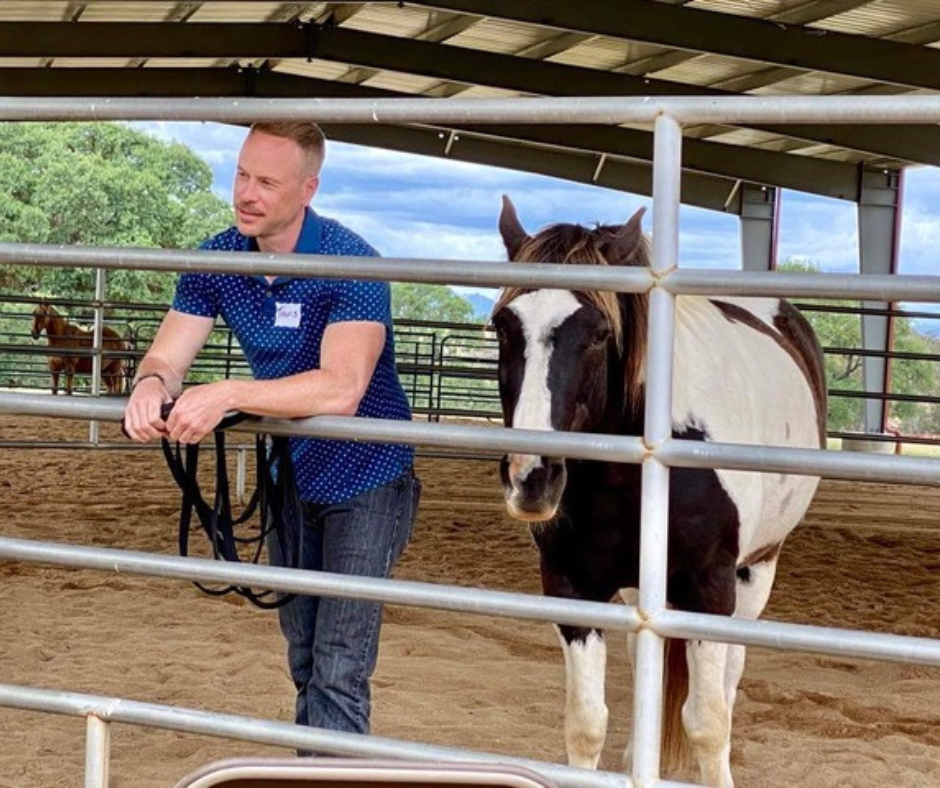
We all navigate many complex relationships throughout every aspect of our lives. Think about all the different interactions that happen just in a single week. From families, to significant others, to exes, to friends, to bosses and coworkers, neighbors, and even those brief interactions at the grocery store. And each one of those is easy to understand, right? Yeah, not so much! The reality is our relationships ask a lot of us. And if you’re like me, you don’t always have the skills or tools to navigate when things get hard or conflict arises. Luckily, I have found that interacting with horses, through the process of Equus Coaching, to be one of the most effective spaces to work through challenges in relationships. You may ask, “How the heck will interacting with a horse teach me anything about my relationships?” Fair question! Let’s look at a recent client example to explore that more.
“Claire” came with a very clear issue she wanted to explore during our session. She had received some feedback from her boss and coworkers that she often seems stressed and defensive at work. But, this is not how Claire sees herself. As she entered the pen, her previous experience with horses was evident as there was immediate comfort between her and the horse. I asked her, “How did it make you feel to get that feedback at work?” Her answer was, “Aggravated because it feels like they are telling me I have to be a better person.” I asked her what she does with that aggravation and she said, “I try to act like things aren’t bothering me.” I could feel her defenses showing up with each of my questions, but decided to go one step further. I asked, “Why do you pretend to feel unbothered?” From there, she became very emotional and sharply stated, “I just want to do my job!”
I thanked Claire for sharing how this feedback was affecting her. It was clear to me that I needed to try a different approach to our conversation – one that she didn’t need to defend against. Luckily, as an Equus Coach®, I have a horse co-facilitator there to help me out. I asked her what she noticed about the horse. She said, “Oh! He’s all the way over there. I didn’t even notice he walked away.” When asked what she thought that meant, Claire guessed that the horse didn’t like what we were talking about. Truthfully, it did seem clear to me as well that the horse could feel the emotional tension of our conversation and wanted more space from it. I asked, “Okay, so we got some feedback from the horse. What do you want to do with that feedback?” It was almost effortless how she took a breath, walked over, and re-established their comfortable connection.
I asked Claire how it felt to receive that feedback from the horse. She said, “It didn’t feel like much. He was just doing what he needed to do.” “Did it feel like he was telling you that you needed to be a better person?” I asked. “Not at all.” Claire said with confidence. We explored together why it was that simple to receive feedback from a horse, but not as simple from humans. Claire realized one of her patterns is to focus a lot of energy on figuring out how she’s ”supposed” to behave to please others. I asked, “How does that pattern affect your relationships at work?” “Oh! A lot!” she exclaimed. “It makes me resentful and I try to avoid interacting with them.” Claire stopped for a moment, then said, “Maybe they’re right. Maybe I am stressed and defensive a lot.”
We let that new awareness settle for a bit.
Through that one interaction with a horse, Claire was able to see herself from a different perspective. And her coworkers’ feedback that had previously felt like a mischaracterization, now felt somewhat true. As we finished our session, we explored what she wanted to change based on her new awareness. First, she wants to stop pretending like nothing bothers her because clearly that’s not working. Second, she wants to let go of figuring out how she’s “supposed” to behave and communicate more truthfully. And third, she wants to remember how easy it was to receive feedback from a horse. She wondered aloud, “If it can be that easy with a horse, why couldn’t it be that easy with a human?”
Claire’s story is just one example of how a horse can help improve human relationships. Consider if there is something you’d like to figure out in your relationships. Where do you consistently struggle? What habits or relationship patterns would you like to change? I believe horses have something to offer there, and I invite you to experience what can be learned from the clear and non-judgmental feedback of a horse.